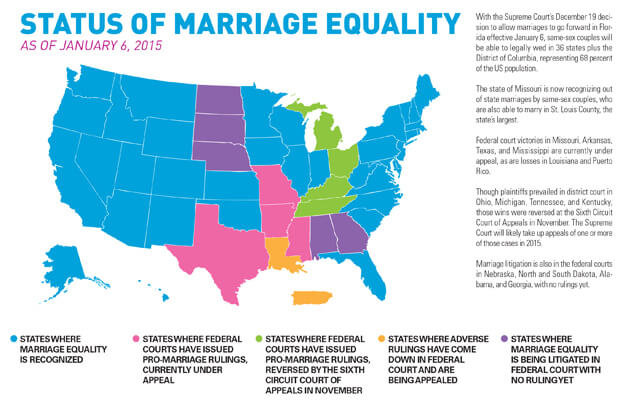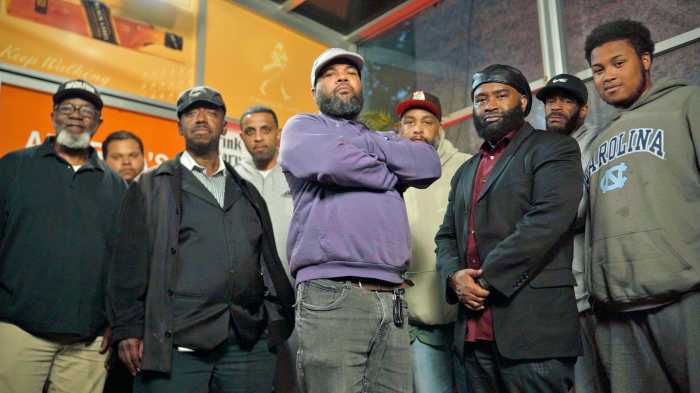A federal district judge in Colorado granted summary judgment on April 5 under the federal Fair Housing Act (FHA) to a couple – two women, one of them transgender – turned down for renting either of two available rental residences by a landlord who cited their “unique relationship.”
Judge Raymond P. Moore found that in turning down the married couple and their two children as tenants, the landlord discriminated based on their sex as well as their familial status, both forbidden grounds of discrimination under the federal law. The court also granted judgment to the plaintiffs under Colorado’s Anti-Discrimination Act, which explicitly bans discrimination because of sexual orientation, transgender status, and familial status.
The landlord, Deepika Avanti, owns three rental properties close to each other in Gold Hill, Colorado, and had two vacancies — one a single family house and the other a townhouse that was half of a two-family structure. Tonya Smith, in April 2105, contacted Avanti about the townhouse, which had been advertised on Craigslist. In her email to the landlord, Smith talked about her family and mentioned that her wife, Rachel Smith, is transgender. Avanti invited the couple and their children to view both rentals, at which time the Smith family met a different-sex couple, Matthew and Chiara, renting the other townhouse in the two-family building.
Colorado trial judge rules for same-sex couple in FHA discrimination case
After that meeting, Avanti sent the Smiths two emails. The first said that they were “not welcome to rent the Townhouse because of Matt and Chiara’s concerns regarding [the Smiths’] children and ‘noise.’” The second message said that Avanti, after discussing the matter with her husband, decided not to rent either residence to the Smiths, explaining, “they have ‘kept a low profile’ and ‘want to continue it’ that way,” according to Judge Moore’s opinion. When Tonya Smith responded, asking what Avanti meant by “low profile,” the landlord replied “that the Smiths’ ‘unique relationship and ‘uniqueness’ would become the town focus and would jeopardize [Avanti’s] low profile in the community.”
The Smiths’ lawsuit detailed how it took the family months to find an alternative home to rent, that they had to put furnishings in storage while they moved in temporarily with Rachel’s mother, and that the home they settled on was less desirable in terms of the local school district and Rachel’s commute to work.
The most significant part of Moore’s ruling relates to his finding on the federal sex discrimination claim. Federal law does not expressly forbid sexual orientation or gender identity discrimination, but courts are increasingly willing to apply bans on sex discrimination to claims brought by LGBTQ plaintiffs. Although the Department of Housing and Urban Development during the Obama administration took the position that the FHA should be construed to apply to sexual orientation and gender identity discrimination, the Trump regime has not yet voiced its view. Moore’s opinion, then, may have broken new ground by granting summary judgment in favor of the Smiths on their sex discrimination claim.
Looking to 10th Circuit Court of Appeals precedent, which governs federal courts in Colorado, Moore noted that in employment cases litigated under Title VII of the 1964 Civil Rights Act, “discrimination against a transsexual based on the person’s status as a transsexual is not discrimination because of sex under Title VII,” and that “Title VII protections” do not extend to “discrimination based on a person’s sexual orientation.”
The 10th Circuit, however, has recognized the possibility that a gay or transgender plaintiff might claim sex discrimination because of gender stereotyping, relying on the Supreme Court’s 1989 Price Waterhouse v. Hopkins ruling that held that discrimination against a woman for her failure to conform to the employer’s stereotyped views of how a woman should act and present herself could violate the statute.
This was enough for Moore.
“The Smiths contend that discrimination against women (like them) for failure to conform to stereotype norms concerning to or with whom a woman should be attracted, should marry, and/ or should have children is discrimination on the basis of sex under the FHA,” he wrote. “The Court agrees… such stereotypical norms are no different from other stereotypes associated with women, such as the way she should dress or act (e.g., that a woman should not be overly aggressive, or should not act macho), and are products of sex stereotyping.”
Moore also stated agreement with the Smiths’ argument that “discrimination against a transgender (here, Rachel) because of her gender-nonconformity is sex discrimination. In other words, that discrimination based on applying gender stereotypes to someone who was assigned a certain sex (here, male) at birth, constitutes discrimination because of sex.”
Moore took care to emphasize that his ruling was based on the issue of stereotyping, not “solely because of Rachel’s status as transgender [or] that the Smiths were discriminated against because of their sexual orientation or identity.”
The court, then, was not explicitly holding that discrimination because of sexual orientation or gender identity per se violates the FHA’s ban on sex discrimination. Still, Moore embraced such a broad view of sex stereotyping that his opinion appears to have much the same effect.
Moore’s finding on the “familial status” discrimination claim was more straightforward, given clear precedent that it violates the FHA for a landlord to have an “adults only” policy and discriminate against prospective tenants because they have children. And the court found it relatively simple to rule in the Smiths’ favor on their state law claims, since Colorado specifically forbids housing discrimination based on sexual orientation, which is defined to include “transgender status.”
The next stage of the lawsuit will be to determine the damages or relief that the court might order.
The Smiths are represented by Karen Lee Loewy and Omar Francisco Gonzalez-Pagan, from Lambda Legal’s New York office, and cooperating attorneys from Holland & Hart LLP’s Denver office, Matthew Paul Castelli and Benjamin Nichols Simler.

































